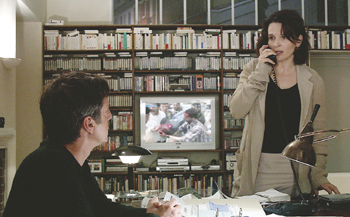![[Metroactive Movies]](/movies/gifs/movies468.gif)
[ Movies Index | Show Times | Silicon Valley | Metroactive Home | Archives ]
Hidden Camera
Michael Haneke's 'Caché' is not a guilty pleasure but a darkly pleasurable guilt trip
By Richard von Busack
WE COMMONLY think of our lives as being the results of deeds done years ago—the concentric ripple of stones tossed in the river of time. But if our lives today are the result of some child's thoughtless stone throwing, that doesn't give much hope for repentance or a new direction.
Caché (meaning "hidden") won director/writer Michael Haneke the award for best director at the Cannes Film Festival in 2005. His conclusions are as tightly controlled as his method, and Caché is far more involving than his other two recent movies here: Funny Games and The Piano Teacher.
The first shot is of a placid street corner of the Rue des Iris in the Cité Floréal district in Paris' 13th Arrondissement. Off-camera commentary tells us that we are watching an anonymous surveillance videotape. The tape arrived accompanied by a scrawled childish drawing, slashed with red ink representing blood.
The tape is the first of many anonymous deliveries. The man of the house on the Rue des Iris is Georges (Daniel Auteuil), who hosts a book-chat program on French public TV. His increasingly menaced wife, Anne (Juliette Binoche), learns that the police will do nothing. Their teenage son, Pierrot (Lester Makedonsky), is kept out of the picture; he practically has a life of his own anyway.
The tapes are meant to stimulate a memory, but of what? When Georges sleeps, it comes back to him: nightmare flashes of his childhood in a country manor house and images of a young Arab child with a bloody mouth.
A new tape gives Georges a different bearing—an apartment house in a bad neighborhood that is the exact opposite of Georges and Anne's chic ivy-covered home.
There, in a cramped room lined with tobacco-stained wallpaper, next to a dingy plastic armoire, sits a grieving middle-aged man named Majid (Maurice Bénichou). He is the remains of a child Georges once wronged. If he is not the one sending tapes, maybe it's Majid's seemingly polite son (Walid Afkir). Or could it be some angry co-worker or pissed-off TV viewer or a fatal-attraction affair? A friend of the family is also a very tender friend of Anne's—perhaps they are closer friends than Georges would like.
As seen in H.G. Clouzot's 1944 thriller Le Corbeau (now available on Criterion), France has a sizable murder of "ravens"—anonymous, denunciatory letter writers. In Caché, the weapon has been updated from anonymous letter to anonymous videotape. Apparently, the amount
of letter writing worsens during
times of political repression in
France; Pauline Kael notes that the Gestapo threw away dumpsterloads during the occupation.
The repression at the heart of Caché is the Paris police's slaughter of some 40 to 400 Algerian protesters on
Oct. 17, 1961. No accurate number exists yet, but the first figure is likely too low, and the last is likely too high. The matter is still only half-disinterred. The incident is so controversial that there was public grumbling from France's right-wing when a discreet plaque was dedicated to the massacred in 2001.
Even the mention of this police-instigated killing is probably what got Caché the prize at Cannes. What merits the prize is Haneke's control—the keenness of the editing and the ability to tell a story with a still, wordless image.
In this political version of Ringu, Haneke isn't giving it to Georges and Anne because they're bourgeoisie, either. They are kind and polite, and they throw amusing dinner parties that aren't even all-white gatherings. Georges has to worry about his job, since his book-business show must to compete with cheaper entertainment.
A burst of humor—a well-paced joke about a reincarnated puppy—matches the spare keen use of shock when a farmyard rooster gets the hatchet. I also savored Haneke's smothered anger in the scene of Pierrot's swimming class. The boy is badgered by his teacher as he swims laps; it's like the scene of Isabelle Huppert's poisonous pedagogue of a piano teacher forcing her students to imitate her own clawlike fingering on the keyboards.
I'd love to know more about Haneke's background: Is the Austrian director a guilty Catholic or perhaps a bad-nerved Calvinist? Effective as it is, Caché seems to suggest that a young boy's thoughtlessness has as much weight as a government's act of mass murder. Even if he's ignoring the nightly news—sometimes one has to, just to function—does that make him complicit?
The atmosphere of guilt is particularly timely in France, torn as it is with riots that are all part of tragedies acted out 40 years ago. For that matter, the story should translate well to America: if they had to remake only one foreign movie this year, Caché would be the best choice.
"We are the United States of Amnesia," says Gore Vidal in the new documentary Why We Fight. Vidal is repeating himself, as a wit always does. (Likely, he thought we forgot the comment the first time we heard it.) But this European story of the consequences of forgetting has its own purpose in our nation. So much seems to slip our minds.
[ Silicon Valley | Metroactive Home | Archives ]
![]()

Viewing Displeasure: Daniel Auteuil and Juliette Binoche get a glimpse of a past they'd rather forget.
Caché (R; 121 min.), directed and written by Michael Haneke, photographed by Christian Berger and starring Daniel Auteuil and Juliette Binoche, opens Friday at selected theaters.
Send a letter to the editor about this story to letters@metronews.com.
From the January 25-31, 2006 issue of Metro, Silicon Valley's Weekly Newspaper.